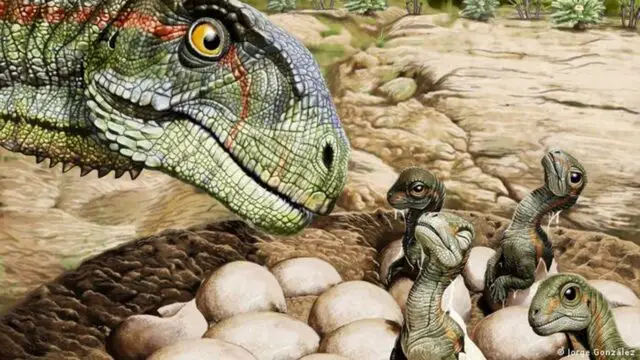A Nest is found with More Than 100 Dinosaur Eggs in the Argentine Patagonia. The find allowed the researchers to reveal that dinosaurs did indeed live in herds, as well as determine how long they did. Some of the eggs found contained dinosaur embryos.
Dinosaurs moved in herds and did so much earlier than previously thought, as confirmed by a study that has analyzed partial skeletons of these creatures and has X-ray examined more than 100 dinosaur eggs found in a fossil deposit, in southern Argentina.
The results published in the journal Scientific Reports indicate the existence of a communal nest and of adults foraging for food and taking care of their young, a behavior that may have given these animals an evolutionary advantage, according to the researchers.
In the past, studies had shown that some of these animals lived in herds. However, it was pending when and how this behavior appeared. This new finding considers that the first dinosaurs could have lived in social colonies 193 million years ago, that is, 40 million years before what was revealed by other records.
Dinosaur eggs with embryos inside
In the early 2000s, an international team of scientists found a 190-million-year-old dinosaur nesting site in the Laguna Colorada Formation (Patagonia) that contained skeletons of Mussauruspatagonicus, a primitive herbivorous sauropodomorph dinosaur (a precursor of large long-necked dinosaurs).

One of the elements that could shed light on how the first dinosaurs lived were the eggs found: “It is difficult to find fossil eggs, and even more so to find fossil eggs with embryos inside since very special conditions are needed for their fossilization”, explains Diego Pol, paleontologist from Conicet (National Council for Scientific and Technical Research of Argentina) and director of the research.
The eggs belonged to a single species of dinosaur
After a complex journey from Argentina (not every day someone carries dinosaur eggs as hand luggage between continents), Pol arrived in France, with 30 of the more than 100 eggs found at the site, in order to analyze them without destroying them.
The CT scan revealed fossilized Mussaurus embryos within some of the eggs and showed that all of these belonged to a communal breeding site for a single dinosaur species. In parallel, the researchers studied the site itself and, based on the sediments, were able to deduce that the nesting site was located on the dry margins of a lake.
Age division
A key aspect is that the dinosaur skeletons were not randomly scattered around the site, but rather were grouped by age. For example, fossils of hatchlings were found near nests. Adults and sub-adults, meanwhile, were frequently associated in pairs or alone, but all within an area of one square kilometer.
To determine the age of the juvenile fossils, the scientists carried out histological studies, that is, they cut a thin sheet of bone and looked at the bone tissue under a microscope: ‘This age segregation is a clear indication of a complex herd-like social structure”, says the Massachusetts Institute of Technology (MIT), which points out that “living in herds may have given Mussaurus and other social sauropodomorphs an evolutionary advantage”.
“It was determined that Mussaurus returned year after year to the same place to form these colonies. It had a highly organized herd structure and this work is the first record of complex social behavior in a primitive species of dinosaurs”, concludes Pol.
Scientists suspect that two other types of early dinosaurs – the Massospondylus from South Africa and the Lufengosaurus from China – also lived in herds at the same time, although the dating of these has been less accurate.


